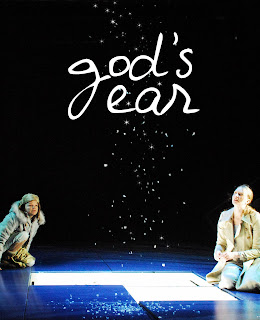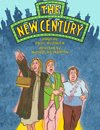 "Good Boys and True" at Second Stage Theatre, April 27, 2008
"Good Boys and True" at Second Stage Theatre, April 27, 2008High school senior Brandon (Brian J. Smith) seems to have it all: looks, brains, athletic prowess, attends the prep school in town, and rich parents. And, he's just been accepted to Dartmouth. He's tall, handsome, captain of the football team and on varsity basketball too.
Wonder what he's up to? (spoiler alert)
You guessed it. This "best little boy in the world" has a bit of a dark side. Turns out he's got a one-way "arrangement" with best-buddy Justin (Christopher Abbott) including plans to room together at Dartmouth. Meanwhile, Coach Shea (Lee Tergesen) has come across a sex tape showing a young man debauching a young woman. It's difficult to tell who the boy is, but the girl is clearly visible. Shea calls Brandon's mother Elizabeth (J. Smith-Cameron) in an attempt to handle the matter discreetly, hoping to rule out Brandon as the perpetrator. Mom can't really tell, and Brandon insists it's not him when confronted (Dad's permanently offstage as a "doctors without borders" type). Mom talks to her sister Maddy (Kellie Overby) about it. Eventually, the girl is found, Cheryl (Betty Gilpin) and she identifies Brandon. Mom talks to Cheryl too. Brandon has also insisted to Justin that it wasn't him. Toss in a bit of back story about the politics of getting football captain involving Coach Shea and Brandon's dad and a somewhat similar event that Elizabeth knew about. Eventually you learn that Justin and Brandon have raised suspicion about their relationship. Brandon finally confesses to Mom, but fails to explain that he taped the event to make the rest of the team thinks he's not gay. The tape was planted in the locker of the guy who stumbled on Justin and Brandon in flagrante.
And it ends.
Right there.
It's not really a new premise (foibles and damaging choices of schoolboys), but Mr. Aguirre-Sacasa has planted some seeds for some really interesting things here. The back story of Brandon's dad and Coach Shea and how the school has turned a blind eye to boys being boys over the years is one. Resolving Brandon's situation is another. It's a frustrating act of shortchange.
As Brandon, Mr. Smith retains the football-hero, boy-next-door appeal he demonstrated last in Manhattan Theatre Club's "Come Back, Little Sheba." Truly tender and callow like most high school senior boys (I was one), he knows everything, and as such, everything will work out all right.
Mr. Abbott's Justin played his outcast role about halfway. He's got the outcast part down pat - aware that he's never going to be "one of the guys." He comes close to being in love with Brandon, but I didn't quite get the heartbreak I had expected when Brandon finally confessed about the tape.
As Elizabeth, Ms. Smith-Cameron gives her best as a mother who realizes her surgical career has indeed kept her from raising the son she thought Brandon was. It was rather a nice moment as she realized that those who ignore history are doomed to repeat it, remembering the incident with her classmate and classmates of her husband.
Mr. Tergesen's Coach is a bit of an apology of a role. It would have been nice to see him given more to work with.
Director Scott Ellis has done fairly well with a strong cast and a not-so-strong script. Coming in under 90 minutes with no intermission, I'd love to see a re-work that streamlines a bit of what has been presented and really provides some resolution in something like, maybe, a second act?
Derek McLane continues his good work with a set filled with trophy cases, nicely enhanced by Kenneth Posner's lighting. Tom Broecker's costumes are serviceable, if unremarkable.











